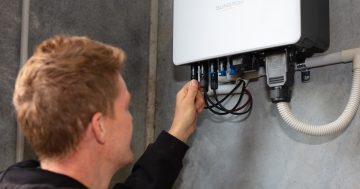Trent Hamm* says frugality is really about efficiency, and that efficiency includes the value of your time and energy.
 When my wife and I first started to turn our finances around, I looked at every single expenditure as an enemy to be conquered.
When my wife and I first started to turn our finances around, I looked at every single expenditure as an enemy to be conquered.
Our philosophy was that the less money we spent, the faster we could escape the financial hole we found ourselves in, so everything that wasn’t justifiable as a “need” should be cut.
We also started practising some rather extreme frugality steps at home — things like washing Ziploc bags by hand, clipping coupons from pamphlets and so on.
The problem, of course, is that chasing every possible cent with frugal steps was wearing us out.
Eventually, we found ourselves backtracking on a lot of our adopted frugal practices, simply because we were worn out and wanted more time to just relax.
We stopped couponing and washing plastic bags, of course, but we also started ordering more take-away, spending more on entertainment, and so on.
A lot of the frugal practices we had picked up went by the wayside.
Not all of them did, however.
What we found is that we kept a lot of the frugal practices that didn’t require much effort or time to maintain.
We kept buying lots of store brand items — doing so didn’t require any extra time or effort.
We kept making grocery lists because we learned that doing so usually saved time as well as money because the time lost to making a grocery list was recouped by less time spent in the store.
We kept our home energy changes, like switching to lots of LED bulbs and modifying our preferred heating settings because it required basically no time and effort to do so.
In short, we found ourselves sticking with lots of frugal steps as long as those frugal steps didn’t require much time and energy to maintain.
It wasn’t just that frugal practices that require little time and energy to maintain were really valuable, but that frugality is really about efficiency, and that efficiency includes your time and energy.
The key is understanding that your time and energy have real value, and the most frugal approach to things is the one that uses the minimum amount of your overall resources — time, money, energy and focus — to get the result you want.
For example, when we were washing Ziploc bags by hand, we were investing quite a bit of effort and time.
That bag cost about $0.06 and washing it by hand and making sure it was dry enough to not have any mould in it took at least a minute.
So, in theory, our savings was about $3.60 per hour of time spent washing bags, right?
Actually … it’s worse than that.
The Ziploc bags would usually fall apart after four or five washes.
The actual rate of savings is about $3 per hour.
Let’s say, instead, we bought some sturdy reusable food containers that could do the job of the bags.
We invest $30 in them upfront and thus never have to buy replacements.
We use those instead of Ziploc bags for taking lunch to work and on picnics.
To clean the reusable containers, we toss them in the dishwasher — basically zero time spent on them.
It takes about 50 uses for a reusable container to get as cheap per use as a Ziploc.
After that, additional uses mean that the reusable container is actually cheaper per use than a single-use Ziploc, meaning the “savings” from washing Ziplocs is even less per hour.
Sorry, it just doesn’t make sense for me — or for anyone else — to spend their time washing Ziploc bags to save less than $3 per hour of effort.
What I’ve learned is that if a frugal task isn’t saving me at least $20 for an hour’s worth of unenjoyable effort, I’m not doing it.
I’m willing to do things I might not normally do to save less than $20 per hour, but I better be enjoying it in some other fashion.
Let’s slice and dice that a little bit, then.
Here are some things that clearly make the cut for me:
- Making meals at home for my family of five.
- Doing home energy improvements.
- Buying store brands.
- Making grocery lists.
- Optimising pretty much any routine I do more than once a week.
- Comparison shopping for individual high-value items.
Here are some things that don’t make the cut for me:
- Clipping coupons (outside of ones that basically fall into my hands).
- Washing Ziploc bags.
- Shopping at several stores to save a couple of dollars.
The difference?
Time and energy have value.
You shouldn’t be spending your time and energy on activities that return very little money.
If your time and energy invested in frugality return substantially less than you would make for similar amounts of time and energy invested in your job, then it’s not a good investment (unless you otherwise enjoy the task).
How do you decide?
Most of the time, I simply trust my gut.
If something seems like it’s an enormous time investment for little return, then I usually trust that it is.
If I’m not certain, I usually try to calculate my savings per hour of effort, and if it’s less than $20 for the hour, it’s probably not worth the time and energy unless I get more enjoyment out of the task.
For example, I get extra pleasure out of making food at home, so making a loaf of bakery-quality bread is worthwhile for me even if the savings per hour compared to just buying a loaf from a bakery is less than $20.
Value your time and energy.
Don’t trade it for only a small financial return.
Life is too short, and it’s just not worth the trade.
* Trent Hamm is the founder of The Simple Dollar.
This article first appeared at www.thesimpledollar.com.











